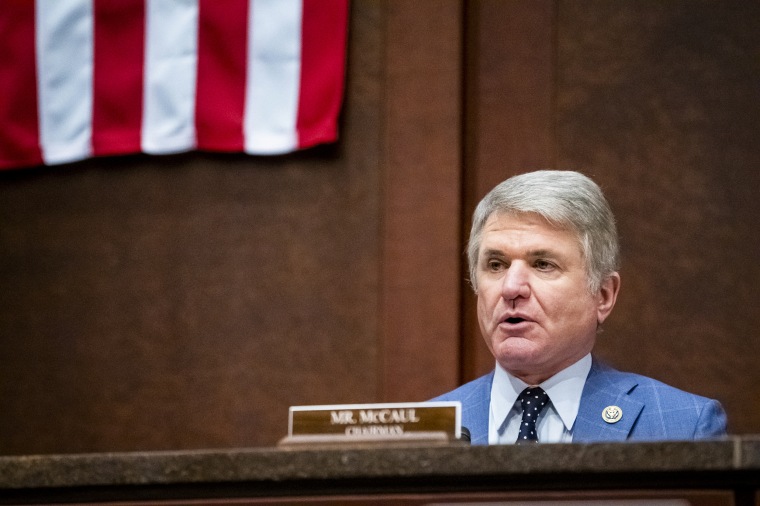The Republican chairman of the House Foreign Affairs Committee on Sunday condemned Sen. Tommy Tuberville’s ongoing hold on hundreds of military promotions, calling it a “paralyzing” move that amounts to a “national security problem.”
“The idea that one man in the Senate can hold this up for months — I understand maybe promotions, but nominations? — is paralyzing the Department of Defense,” Rep. Michael McCaul, R-Texas, said in an interview on CNN’s “State of the Union.” “I think that is a national security problem and a national security issue.”
Tuberville, R-Ala., who is a member of the Senate Armed Services Committee, has blocked hundreds of military promotions for months over his objection to a Defense Department policy that provides paid time off and reimburses travel costs for service members and dependents seeking abortions.
The Defense Department’s policy on abortion has drawn heated debate among congressional lawmakers and has become a major part of negotiations on the National Defense Authorization Act, an annual must-pass defense policy bill. The GOP-led House passed its version of the legislation after it added an amendment that would force the Pentagon to rescind the policy.
The Democratic-led Senate, however, passed its own version of the NDAA in July after it bypassed floor votes on amendments related to abortion access and transgender health care in the military.
McCaul said Sunday that he wishes Tuberville would reconsider the hold on military promotions, adding that the abortion issue is being worked out in the NDAA.
“But to hold up the top brass from being promoted — and lower brass — I think is paralyzing our Department of Defense,” he said.
Reached for comment, Steven Stafford, a spokesperson for Tuberville, said McCaul’s remarks are “inaccurate.”
“No one can stop [Senate Majority Leader] Chuck Schumer from holding votes on these nominations. He just doesn’t want to,” Stafford said in a statement. “It’s also inaccurate because acting officials are in all of these roles. In some cases these acting officials are the nominees for permanent roles. No jobs are open or going undone right now.”
Some of McCaul’s Republican colleagues are trying to deflect criticism over Tuberville’s military blockade by blaming Schumer, D-N.Y. They argue that Schumer should schedule individual votes for the hundreds of military promotions Tuberville is holding up.
President Joe Biden has sharply criticized Tuberville for continuing his hold on hundreds of military promotions as he announced plans for more military nominations.
“What Senator Tuberville is doing is not only wrong — it is dangerous,” Biden said in a statement in July. “In this moment of rapidly evolving security environments and intense competition, he is risking our ability to ensure that the United States Armed Forces remain the greatest fighting force in the history of the world.
“And his Republican colleagues in the Senate know it,” Biden added.
Defense Secretary Lloyd Austin also decried Tuberville’s hold at a relinquishment ceremony for the chief of naval operations, Adm. Mike Gilday, at the U.S. Naval Academy in Annapolis, Maryland, last month.
“Because of this blanket hold, starting today, for the first time in the history of the Department of Defense, three of our military services are operating without Senate-confirmed leaders,” Austin said at the event.
“This is unprecedented, it is unnecessary, and it is unsafe,” he added. “This sweeping hold is undermining America’s military readiness. It’s hindering our ability to retain our very best officers. And it’s upending the lives of far too many American military families.”

